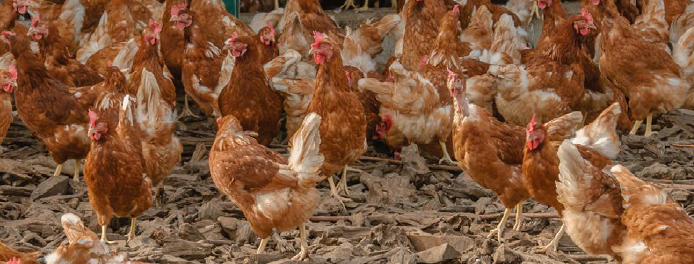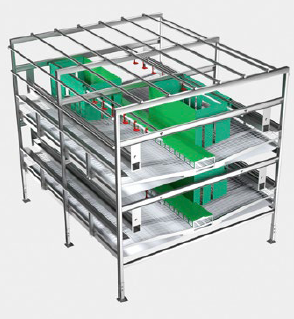
Innovation, Sustainability, and Animal Welfare
INTRODUCTION
The laying poultry sector is undergoing a significant transformation, driven by evolving consumer expectations, technological advancements, and increasing pressure to adopt more sustainable practices.
The key trends for this year are as follows:
Sustainability remains a fundamental pillar for egg producers. Consumers are becoming increasingly demanding regarding the environmental impact of the products they purchase, particularly concerning animal welfare, waste reduction, and the carbon footprint of production. In this context, renewable energy and circular economy strategies, such as the recycling of poultry by-products, are gaining prominence.
Zucami has been a pioneer in developing innovative solutions to reduce environmental impact, offering adjustable ventilation systems, efficient heating, and evaporative panels, all tailored to the specific climatic conditions of each region.
Thanks to these technologies, producers can improve energy efficiency, reduce CO₂ emissions, and ensure a comfortable environment for both the birds and the surrounding ecosystem.
2.Animal Welfare
Animal welfare remains a central priority for both regulators and consumers. Housing systems must allow birds to behave naturally, which not only benefits their health but also improves productivity.
Advanced technology has enabled the development of more efficient solutions to ensure bird welfare, facilitating health monitoring and providing a more suitable environment for their development. Modular aviary systems offer great flexibility and adaptability to different farm sizes, ensuring optimal conditions for the birds at all times.

Aviaries such as GREEN WAY for layers feature a modular system that allows for high housing capacity in diverse spaces, improving mobility and bird welfare. Additionally, this system incorporates smart monitoring technologies, enabling producers to track bird health in real-time and ensure they are in an optimal environment throughout the production process.
3.Technology for Optimizing Production and Poultry Health
Digitalization and the use of advanced technologies, such as sensors, artificial intelligence (AI), and remote monitoring, are revolutionizing farm management. These advancements optimize operational efficiency, improve animal health, control feeding, and enhance product traceability.
Zucami’s new aviary models are designed to facilitate efficient bird supervision, allowing direct access to eggs and nest boxes from the aisle. This setup enhances inspection and monitoring capabilities, ensuring birds are well-managed.
Moreover, these systems optimize available space, promoting greater bird mobility and adaptability from the start, contributing to their overall welfare. The removable nest system simplifies cleaning and disinfection, while egg collection belts enhance collection capacity. The entire system is designed for easy installation and maintenance, facilitating efficient farm management.
4.Traceability and Transparency in the Supply Chain
Traceability has become a priority for consumers, who demand to know the origin of the products they consume. Emerging technologies such as blockchain are beginning to be implemented to ensure transparency in the poultry supply chain. These technologies allow consumers to verify production conditions and the origin of eggs, increasing trust in the final product.
Traceability also plays a crucial role in biosecurity management, enabling better supervision of production conditions and helping prevent disease outbreaks on farms.
5.The Impact of Artificial Intelligence on Farm Management
Artificial intelligence (AI) and the Internet of Things (IoT) are beginning to transform the way poultry farms are managed. These advancements enable optimization in areas such as feeding, animal health, climate control, and real-time data collection, facilitating informed decision-making.
According to a Grand View Research (2023) report, the agricultural technology market, including the poultry sector, is expected to grow at a compound annual rate of 20% between 2024 and 2030.
Government regulations related to the production of animalbased foods are becoming stricter, and producers must comply with rigorous standards on animal welfare and food safety. Responsible production certifications are gaining ground in global markets and help consumers identify products that meet high ethical production standards.
Conclusion
Sustainability, animal welfare, technology, and evolving consumer expectations are defining the future of poultry production.
Producers who embrace these trends can expect not only greater efficiency and competitiveness but also increased consumer trust.
The poultry industry continues to play a crucial role in global food production, driven by continuous technological advancements and a growing commitment to animal welfare. Zucami continues to demonstrate its ability to adapt to market demands, ensuring both sustainability and efficiency in its processes.
In a context of increasing demand for sustainable and ethically responsible products, the future of poultry farming is heading toward a more innovative model aligned with the expectations of the 21st century.
Subscribe now to the poultry technical magazine
AUTHORS

Layer Longevity Starts at Rearing
H&N Technical Team
The Strategy for a Proper Infectious Bronchitis Control
Ceva Technical Team
Elevate Hatchery Performance with Petersime’s New Data-Driven Incubation Support Service
Petersime Technical Team
Maize and Soybean Meal Demand and Supply Situation in Indian Poultry Industry
Ricky Thaper
Production of Formed Injected Smoked Chicken Ham
Leonardo Ortiz Escoto
Antimicrobial Resistance in the Poultry Food Chain and Novel Strategies of Bacterial Control
Edgar O. Oviedo-Rondón
GREG TYLER INTERVIEW
Greg Tyler
Insights from the Inaugural US-RSPE Framework Report
Elena Myhre
Newcastle Disease: Knowing the Virus Better to Make the Best Control Decisions. Part II
Eliana Icochea D’Arrigo
Avian Pathogenic E. coli (APEC): Serotypes and Virulence
Cecilia Rosario Cortés
The Importance of Staff Training on Animal Welfare Issues in Poultry Industry
M. Verónica Jiménez Grez
Rodent Control is a Key Factor in Poultry Biosecurity and Sustainability
Edgar O. Oviedo-Rondón